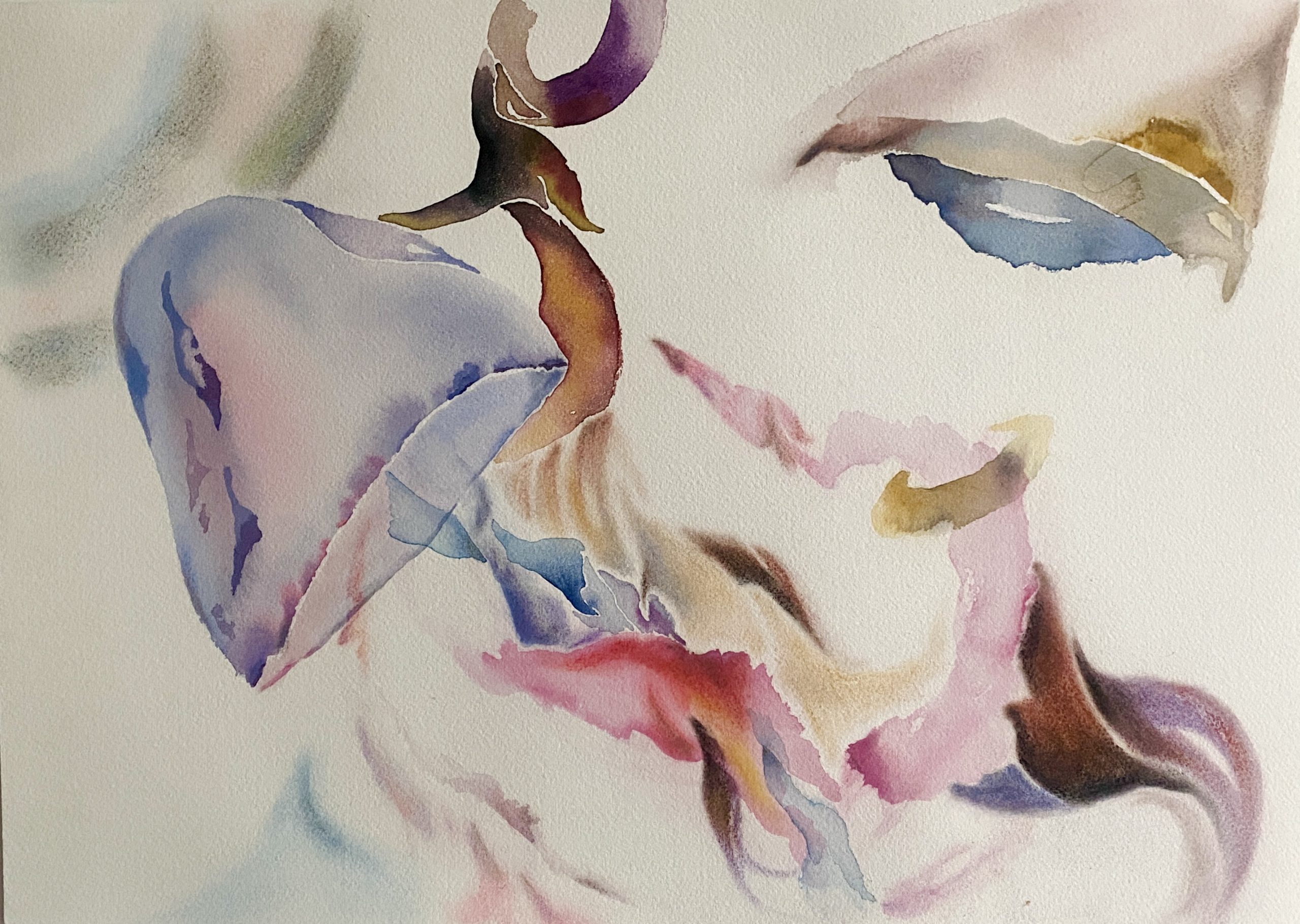Jellyfish Do Not Have To-Do Lists

art by Leah Huang
Matthew Wilbur has been unconscious for 22 minutes. His wife Erin sits in a too-bright waiting room, gnawing on the thumbnail of her left hand while scrolling her phone with her right. Currently, she’s researching jellyfish. This morning, the Wilburs’ daughter, Julia, informed her parents that she has to choose an animal, create a 3D model, and write a note card with five facts about that animal for her third-grade science project. Julia said that the jellyfish is her favorite animal, which was news to Erin. The project is due tomorrow.
Erin wades through her purse for gum or candy or something to chew on other than the stubs of her nails. Her purse has two spare diapers, her wallet, EpiPens, an empty applesauce pouch, that pouch’s cap, three ChapSticks and a pad. There’s a bottle of generic Xanax that’s down to three pills. She adds “buy gum” to the to-do list she keeps running in her head.
In her research, Erin learns that jellyfish do not have brains. They rely on their nervous system for everything. Automatic reflexes do all the work. Every function is involuntary, every second of their lives is the result of chance.
They have no need for a brain.
A TV in the waiting room airs a home improvement show on mute. There are regular taps on a keyboard as patients get checked in. A woman with white hair whispers to the man next to her, presumably her husband, and offers him a Life Savers mint. He swats her hand away, and she pops the candy into her own mouth. She clicks it against her teeth. Erin cringes a little at the sound of hard mint hitting enamel.
Since having kids, Erin cannot remember silence. Blocks toppling. Cheerios landing in a bowl. The incoherent string of swears after Matthew steps on a Lego brick. Her children’s breath. The echoes of their laughter when they’re supposed to be sleeping.
They are not all good sounds. The crack of Julia’s head hitting the kitchen tile. The rattle in Evan’s lungs when he had RSV. Both of them crying for their mom, Erin paralyzed with indecision of who to help first.
Sometimes her mind is filled with the noise of hypotheticals. Like if Erin were in a sinking boat and could only save one child, who would it be? Or if she and Matthew go out to dinner and leave the kids at home with a babysitter and they get hit by a bus, would her sister be a good substitute mother? Would she remember to buy the toothpaste with fluoride and that Evan hates the strawberry kind?
Other times, there is just a carousel of tasks and reminders. There are shoes to size up, camp registrations, and the surprise room-parent duty.
Jellyfish do not have room-parent duty.
During last year’s beach vacation, Erin waded into the cool North Carolina waters while Matthew and the kids built a sandcastle. An unexpected wave pulled Erin under. For a moment, all she heard was the thundering ocean hugging her from all sides. It was louder and more aggressive than the ocean setting on the kids’ noise machine, but Erin finally felt stillness, quiet. Her mind was blank. She saw no highlights reel, no flashes of the good times. Eventually she got her footing and sprung out of the water. Matthew and the kids hadn’t noticed.
A Google search tells Erin that colonoscopies can vary in length, but now, at 37 minutes, Matthew’s may be winding down. Erin thumps her heels against the metal chair legs like a child pumping on a swing. The thuds are so loud that Life Savers Lady whips her head around and sneers.
While Erin gives an apologetic shrug, she thinks, fuck you. I hope your husband dies. Erin isn’t proud of it, but she figures the waiting room isn’t a place for charitable thoughts. (Life Savers Lady’s husband will not die for many years and not from anything having to do with his colon. It will be a heart attack while putting up Christmas lights, which will provide comedic relief during an otherwise touching eulogy.)
Erin starts to text Matthew about how embarrassed and shitty she feels about LIfe Savers Lady when she remembers he’s in the back being probed. She throws her phone into her purse, knowing she’ll likely fish it out again in seconds.
Erin forces herself to think kinder thoughts about the man who she just wished death upon. She hopes he is OK in the same way she hopes Matthew and her kids and the whole world will be OK. An urge to put bandages on boo-boos, give them kisses, send them on their way.
Jellyfish do not feel guilt. Without a brain, jellyfish are not even conscious that they are alive. If Erin were a jellyfish, Erin would glide through life until her body failed, which she wouldn’t be aware was happening.
In under 10 minutes, Erin will find out Matthew is fine. She’ll come to the recovery room where he’ll have his lopsided smile and his wild dusty brown curls springing out in all directions. He’ll say to Erin, “Hey toots, you come here often?” with the straw from his ginger ale dangling from his mouth. Erin will laugh, not because it’s funny, but because she finally can. The doctor will suggest probiotics, less red meat, more exercise. Erin will mentally recalibrate meals and family outings to aid Matthew’s GI.
The big, scary medical appointment, the one they will later call “The Day,” is not for another seven years. Instead of Matthew’s colon, it will be Erin’s breasts. Their daughter, the one with the jellyfish project due tomorrow, will use “The Day” as fodder for a heartbreaking college admissions essay. Erin will think it’s overwritten, but she won’t be asked her opinion.
Erin will react to “The Day” the same way she does with every crisis: a series of lists, bursts of home organization and calls to various experts. She will desperately, frantically hold tight to the feeling that if she can just make order of everything externally, the rogue cells will fall in line. She will create a folder in her email called “Cancer – Erin,” as if it were one in a series. She will mother her children as if her hair isn’t falling out in clumps, her body feeling like it could collapse into a pile of ash. When relatives and friends see Matthew, they will cock their heads to one side, put a hand to their hearts and tell him he’s an amazing father.
Erin in the present, in the waiting room, closes her eyes and tries to make her mind go blank, like a jellyfish. Thoughts stack on top of each other. When Julia was 2, a neighbor told Erin, “Small kids, small problems; big kids, big problems.” Erin thought it an incomplete phrase. What do adults have? Cataclysms? The persistent feeling of drowning? She smiled in gratitude anyway.
Erin taps her tendrils on the arm of the chair.
She smells something comforting, warm. Maybe garlic. A woman in coral scrubs exits the door that leads to the exam rooms, holding her lunch. Erin tries to work out how the space beyond the door is arranged so that one person can heat up food while others are unconscious on tables.
A squat man in teal scrubs, more sea cucumber than jellyfish, opens the door that leads back to the exam rooms.
“Matthew Wilbur?”
As Erin stands, the bones in her legs evaporate, leaving behind rubbery tentacles. Her mind goes blank. There are no more keyboard clacks. Life Savers Lady is gone. Erin can hear only the thunderous waters, wrapping her up like that day in North Carolina. There is nothing she has to do but propel herself forward, always forward.


